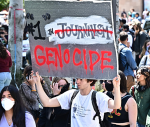You are here
Kurdistan referendum
Jul 12,2014 - Last updated at Jul 12,2014
The intention of the Kurdish region in northern Iraq to hold a referendum on breaking away from Iraq and establishing an independent Kurdish state raises the spectre of a clash between two fundamental international laws.
The UN Charter is based on respect for the territorial integrity of UN member states on one hand, and respect for the right of self-determination on the other. Paragraph 4 of Article 2 of the UN Charter specifically states that “All Members shall refrain in their international relations from the threat or use of force against the territorial integrity or political independence of any state, or in any other manner inconsistent with the purposes of the United Nations”.
This provision comes under Chapter 1 of the charter on the purposes and principles of the UN. Yet Paragraph 2 of Article 1 of the charter lists “to develop friendly relations among nations based on the respect for the principle of equal rights and the self-determination of peoples...” as among the purposes of the UN.
It will be noticed that Paragraph 4 of Article 2 mentioned above speaks of the protection of territorial integrity and political independence of states in the context of the call on UN state members to refrain from threatening these rights from the outside, meaning by an act of aggression.
In other words the charter’s admonition against threats to the territorial integrity or independence of countries is not addressed to “peoples” within states that opt to exercise the right of self-determination.
The right of self-determination is also a cardinal principle in international human rights. Article 1 of both the International Covenant on Economic, Social and Cultural Rights and the International Covenant on Civil and Political Rights cannot be more explicit regarding the right of self-determination of peoples as sacrosanct.
This provision reads as follows: All peoples have the right of self-determination. By virtue of that right, they freely determine their political status and freely pursue their economic, social and cultural development.”
It follows from the foregoing that if the Kurds in Iraq constitute a people, then they qualify to exercise the right of self-determination. The exercise of this right must, of course, be peaceful and reasonable and through negotiations with the central government in Baghdad where possible.
Sooner or later all peoples are destined to exercise this right. The more systematically and peacefully it is pursued, the better for all sides.
In this connection, it is noteworthy that while the US opposed the Kurd’s initiative at least rhetorically, Russia remained silent, presumably out of respect for its defence of the right of self-determination exercised in the Crimea a few months ago that led to its separation from the Ukraine.
Most capitals have yet to voice their opposition to the Kurdish bid for independence, probably because they recognise that the right of self-determination overrides the territorial integrity of countries.













